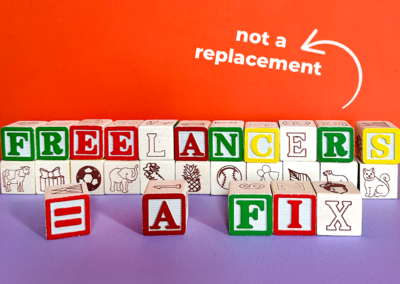The future of when and where we’ll work might still be a little hazy for most of us, but one thing is clear; regardless of whether we’ll work from home 5 days a week or work from an office 1 day a week, the virtual processes we’ve created over the past 18 months aren’t going away.
Remote work will now always be a part of our future.
Our employee’s experience (EX) will never solely rely on an in-person strategy ever again, which means our EX will be largely defined by how our teams connect and collaborate together online.
Employee experience matters now more than ever before.
Workers around the world are moving on from their current jobs in search of a better employee experience. Since much of the world’s organizations are working remotely, workers have an endless pool of companies to work with, and employers have a global pool of applications to choose from.
According to the World Economic Forum, self-management and interpersonal communication are among the “hot” skills in the post-pandemic workplace.
Now more than ever, employees want to have an experience that contributes to their growth, and their growth paths may all look a little different.
The jobs of tomorrow reflect the adoption of new technologies and increasing demand for new products and services.
But they also showcase the continuing importance of human interaction in the new economy through roles in marketing, sales and content production and other positions that require “soft” communication skills.
While the workforce is more empowered than ever before, this leaves companies at risk of losing their best employees.
The numbers expected to change jobs ranges from 26% to 40% and it has been coined The Great Resignation of 2021.
The Microsoft Work Trend Index found that 40% of people want to change jobs this year. A survey of workers in the U.K. and Ireland put the number at 38% and a similar U.S. survey found 26% of workers are planning to leave their current job over the next few months.
So, if your organization hasn’t yet mitigated the risk associated with The Great Resignation of 2021, then it’s time to ask your leadership team a couple of powerful questions to create a sustainable, remote employee experience and a culture that truly values and retains talent.
1. How do we refine the hiring process to not only attract the best talent, but to ensure every candidate has a positive experience working with us?
A brand experience starts from within an organization.The hiring process is one way in which you open the doors for the world to interact with your brand, its values, and your team.
Whether you’re hiring a full-time employee, a contractor or freelancer, you should want each of them to be treated with respect, fairness and have an overall positive interview process. A highly positive, or poor, experience will surely find its way onto the many online forums like Glassdoor, which are specially designed to collect candidates and employee feedback.
The world is small, especially if what you’re hiring for is niche (looking at you, tech industry.)
One of the best ways to create a positive experience is to streamline your processes and to create positive experiences regardless of the outcome. Ensure your recruitment team and hiring managers are equipped to answer the below questions.
-
-
- What is the candidate’s journey from the moment they see your opening position on your website?
- What correspondence do they receive when they apply to your position?
- How quickly does your team follow up?
- Do you leave rejected applications to wonder for weeks on end or are you upfront and transparent with your decisions?
-
Remember, you’re not just interviewing candidates, they are also interviewing you.The workforce today is well aware of what they want and don’t want and if your company can’t provide the values that matter to them, they won’t apply. People have had a lot of time over the last year to think about what role they want work to play in their lives. Is your organization catering to the needs of the workforce in 2021 and beyond?
2. How are we building an inclusive and remote onboarding process that helps employees feel connected to our company culture, purpose and team?
Onboarding isn’t just about getting a new employee up to speed with their job and responsibilities. It’s about creating a space, environment and experience that makes them feel a part of a team, which is especially important within a remote environment.
The onboarding experience should help employees:
-
-
- Understand the culture, vision and purpose of the organization.
- Learn the role they will play in the company mission.
- Feel excited and motivated to be a part of something unique. (Plus, who doesn’t like swag and welcome packs?)
- Implement remote-first best practices and processes.
- Connect with colleagues, and build new relationships outside of relying on just in-person-based relationship building. (Last March, Forbes published five tips on how to help your team connect virtually.)
- Have a powerful digital experience with the company. This means access to digital resources and tools to help them manage their employment info, access training, and network with teams across the organization.
-
3. How are we helping leaders build their skills to engage and lead a remote team?
Leadership accounts for up to 70% in the variance of employee engagement (Gallup, 2019) — meaning, if leaders aren’t equipped to manage the nuances of remote environments, they’re putting employee retention rates at risk.
Preventing and managing stress brought on by work, and avoiding burnout have become issues exacerbated by the pandemic and remote work.
In an office setting, it’s a lot easier to observe how your colleagues, teammates and management are reacting and engaging with one another. As we continue to adapt to remote work scenarios, emotional intelligence will be difficult to cultivate, but is more important than ever to support autonomous work and socialize virtually.
In order to implement a successful remote work plan, leaders need to shift their mindset to prioritize communication, diversity and independence. We need to understand how to listen and express ourselves effectively online, and if our team is based all over the world, we’ll need to become more resourceful and self-sufficient.
Emotional intelligence accounts for 25-45% of workplace performance, and unlike IQ, EI is something that you can improve with training.
Helping others to build their awareness, their responsibility, and consequently, their self-belief lays the foundation stones of their own future leadership capability in a remote workforce.
4. How are we equipping our teams with the knowledge, resources and learning to help them build emotional intelligence to support them in their work?
Workers are increasingly looking to learn personal development and self-management skills which means without a clear learning and development strategy for your employees, you’re not only putting your organization’s growth at risk, you’ll also risk retaining your best talent.
If the pandemic has taught us anything in the remote environment, it’s this:
The success of remote employees is not based on their ability to do their jobs and fulfill their duties, it’s based on their ability to self-manage and regulate themselves through self-awareness and build the skills needed to effectively communicate, express themselves and build relationships with their colleagues.
Start with first collecting the training and development needs from your team. Then, ask:
What can your organization do to ensure new hires feel comfortable and supported in their new role?
Whether it’s fitting to train managers to help them create meaningful career paths for their teams, or offer an optional training program based on their role or interests, their experiences should be based upon your team’s ability to create an authentic experience that aligns with your organization’s culture.
Shauna’s Socials: LinkedIn, Twitter,Website
Editor’s Socials – Dominque Dajer: LinkedIn, Twitter, Instagram



